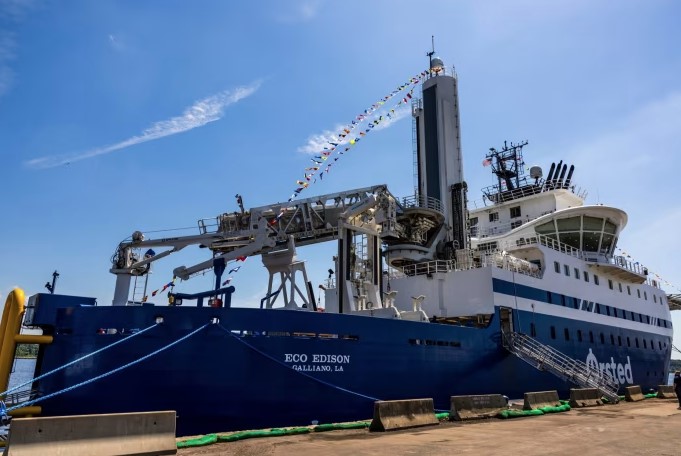In recent days, relations between Denmark and the United States have been tested in unexpected ways. What seemed like routine cooperation in energy projects has turned into a source of tension. A major offshore wind project, valued at $1.5 billion and owned by Danish energy company Ørsted, was abruptly stopped by US authorities.
Ørsted Wind Farm Halt Shakes Energy Ties
The decision immediately rattled markets. Shares of Ørsted dropped sharply, reaching record lows. Investors saw the move not only as a business setback but also as a signal of rising friction between two allied nations. The project, planned off the coast of Rhode Island, had been a showcase of transatlantic cooperation in renewable energy. Instead, it has become a flashpoint for uncertainty.
This halt is not the first time energy projects have faced such obstacles in the United States. Similar restrictions have been applied to other international companies in the past. For Denmark, however, this case felt different because of the broader political tensions surrounding Greenland and Arctic security.
🇺🇸🇩🇰 America Eyes Greenland Again — Not to Buy, But to Back Strategic Expansion
Greenland at the Center of Tensions
Greenland, a semi-autonomous region within the Kingdom of Denmark, has long been a strategic point for the United States. The island sits in the Arctic, where global powers compete for influence, resources, and military positioning. The United States already operates a military base there, but Washington has also shown interest in deeper involvement.
The focus on Greenland has created unease in both Copenhagen and Nuuk, Greenland’s capital. The idea of territorial interest expressed by a superpower has revived debates about sovereignty and security. Officials in Greenland have voiced surprise and confusion, noting that expansionist rhetoric seemed like a concept from the past.
Denmark has responded by showing its own military presence in Greenland. Naval ships, helicopters, and fighter jets have been sent to the region. These moves are seen as steps to underline sovereignty while maintaining cooperation with allies. Other European powers have also shown interest, visiting Greenland to express solidarity against any suggestion of territorial acquisition.
Foreign Powers Threatened as Greenland Cracks Down on Foreign Interference in Elections
For Greenland, the issue is not only about security. The island has untapped mineral resources that attract international investors. However, high costs, harsh climate conditions, and long timelines have kept most investors away. The region continues to look for partners, but large-scale projects remain difficult to establish.
At the same time, Ørsted has unexpectedly become linked to this larger story. Since the Danish state owns about half of Ørsted, any setback to the company also has national significance. This has raised questions about whether commercial energy projects are being drawn into the same tensions that surround Greenland.
Ørsted Becomes a Symbol of Strained Alliance
The latest pressure on Ørsted has added to Denmark’s long-standing challenge: balancing its alliance with the United States while protecting national interests. The United States remains Denmark’s key security partner, especially in the Arctic. Yet the same partner has also introduced uncertainties that feel more like threats than guarantees.
Denmark’s strategy so far has been to keep dialogue open and avoid open confrontation. The official stance has been that American interests in security and resources can be addressed without any territorial changes. Copenhagen and Nuuk have repeatedly stated that they welcome a stronger American presence for security cooperation.
At the same time, the financial burden on Ørsted highlights how commercial entities can get caught in geopolitical struggles. With the Danish state holding a significant share in the company, the halt directly affects the kingdom’s economic interests. For investors and officials alike, the question has become whether energy projects are being pulled into a larger shadow conflict over Greenland.
Pentagon Seizes Arctic Edge: Greenland Now Under U.S. Homeland Military Watch
The stoppage of Ørsted’s project came just as Denmark sought to highlight its commitment to renewable energy partnerships abroad. While officials celebrated international cooperation in climate and energy, the sudden setback in the US has made these efforts appear fragile.
Denmark now finds itself in a delicate position. On one side, it needs the United States as an ally in Arctic defense and global security. On the other, it faces the reality that political shifts in Washington can disrupt both national strategies and commercial ventures. From Greenland’s icy frontiers to offshore wind farms developed by Ørsted in American waters, the signs of pressure are becoming harder to ignore.
